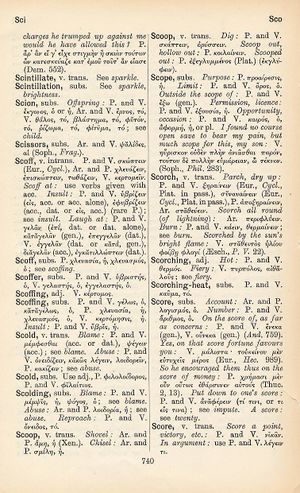score: Difference between revisions
From LSJ
m (Woodhouse1 replacement) |
m (Text replacement - "ἄριθμος" to "ἀριθμός") |
||
| Line 5: | Line 5: | ||
[[account]]: [[Aristophanes|Ar.]] and [[prose|P.]] [[λογισμός]], ὁ. | [[account]]: [[Aristophanes|Ar.]] and [[prose|P.]] [[λογισμός]], ὁ. | ||
[[number]]: [[prose|P.]] and [[verse|V.]] [[ | [[number]]: [[prose|P.]] and [[verse|V.]] [[ἀριθμός]], ὁ. | ||
[[on the score of]], [[as far as concerns]]: [[prose|P.]] and [[verse|V.]] [[ἕνεκα]] (gen.), [[verse|V.]] [[οὕνεκα]] (gen.) ('Andromache'' 759). | [[on the score of]], [[as far as concerns]]: [[prose|P.]] and [[verse|V.]] [[ἕνεκα]] (gen.), [[verse|V.]] [[οὕνεκα]] (gen.) ('Andromache'' 759). | ||
Revision as of 16:10, 20 June 2020
English > Greek (Woodhouse)
substantive
account: Ar. and P. λογισμός, ὁ.
on the score of, as far as concerns: P. and V. ἕνεκα (gen.), V. οὕνεκα (gen.) ('Andromache 759).
yes, on that score fortune favours you: V. μάλιστα τοὐκείνου μὲν εὐτυχεῖς μέρος (Eur., Hecuba 989).
so he encouraged them thus on the score of money: P. χρήμασι μὲν οὖν οὕτως ἐθάρσυνεν αὐτούς (Thuc. 2, 13).
put down to one's score: P. and V. ἀναφέρειν (τί τινι, or τι εἴς τινα); impute.
verb transitive
score a point, victory, etc.: P. and V. νικᾶν.
in argument: use P. and V. λέγω, λέγειν τι.

